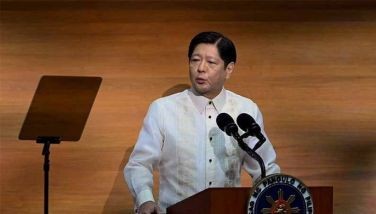Words

Democracy, observed a statesman, is governed by words. Conversely, tyrannies are governed by swords.
In our democracy, the President’s State of the Nation Address (SONA) has evolved into the most important ritual for civic convergence. Once every year, the nation focuses on what the President has to say.
We have discourse in place of pageantry. We have a symposium instead of a parade to honor the Republic we worked to hard to build.
Because the President’s address becomes the nation’s focus for a day, the delivery evolved its own political dynamic. The legislators and their guests appear in their very best indigenous fashion. The minority strands of opinion try to break into the national discussion by holding demonstrations in the streets. Our entire media universe transforms into a forum for reviewing what was said and what was left unsaid.
Whatever is said or unsaid will eventually be forgotten. But the discursive democracy that happens is a living thing that must be nurtured.
We must celebrate the fact that we never had the equivalent of lese majeste laws that penalize criticism of the sovereign. Willie Nepomuceno, who very sadly passed away the other day, parodied President Marcos Sr. during the darkest depths of martial law and was entertaining enough not to be jailed. Trying to address his people as his regime crumbled during the Edsa Revolution, Marcos Sr. had to first convince us that this was not Nepomuceno speaking.
In Russia last week, an ultra-nationalist blogger who supported the war in Ukraine was jailed by Putin’s agents for calling his country’s leaders incompetent. In Thailand, because of strict laws shielding the monarchy, jail time is guaranteed for anyone saying anything less than flattering about the King.
Comparison magnifies the scope of freedoms we enjoy. Here, complaining about the perceived failures of government is a national pastime. The communist agitprop groups chronically resort to slander and vilification of the nation’s leaders. No public personality enjoys any protection from parody or satire or even ruthless bashing.
Our libel laws admonish public personalities about being too “onion-skinned” about criticism. That opens wide latitude for commenting on official actions and utterance. It encourages our media to be “free-wheeling” in expressing political opinion.
The delivery of the SONA does not only provide an arena for our people to argue. It condenses as well as polarizes public opinion.
This year, President Marcos Jr. delivered a speech that very much reflects his personality and his world view. It was a speech stripped of applause lines to enable brevity. Nevertheless, it was interrupted about 60 times by clapping and cheering.
The speech delivered was pretty much an executive report such as is presented by a CEO before his board and stakeholders. It is loaded with facts and figures. Management theory teaches us that everything must be measurable to be manageable. The speech gave us enough of a lowdown about where we are and where we are going.
Boiling down the SONA into an executive report is not the worst thing that could be done for a speech of this significance. The absolutely worst thing that could be done is to gum the speech up with opaque statements and needless rhetorical flourish. Had someone else been elected president, we would likely get this sort of speech.
Like the President itself, the speech is Spartan. There was none of the audio-visual distractions that characterized some previous addresses. It is for the audience to visualize what was said.
Like the President, too, the speech was forthright. There was nothing in it that was unduly provocative or quarrelsome. There was nothing in it that might be called pompous or self-aggrandizing.
Personally, I was relieved the President did not repeat that nonsense about bringing down the price of rice to P20 per kilo. This is a futile goal akin to Cory Aquino’s promise to bring down the price of galunggong.
In order to bring down the price of rice to P20, government must subsidize the commodity by much more than the retail price. That can be made to happen only if government steps in to provide subsidies at every stage of production and distribution, from free fertilizers and farm implements to free milling, warehousing and distribution.
To bring down the price of rice to P20, government will have to borrow hundreds of billions, adding to our already heavy pandemic-inflated public debt. It should never be government’s goal to have the cheapest rice in the world. The goal should be to have enough of this staple commodity in the face of possible food shortages globally wrought by climate change.
It is probably fair to describe the speech as technocratic. But that is precisely what modern speeches should be. They must be stripped of demagoguery and respect the economy of time for the sake of the audience.
As a technocratic speech, it is not intended to arouse and mobilize the people in pursuit of collective goals. This, too, is consistent with Marcos Jr.’s worldview as articulated in his inaugural speech. In that maiden speech as president, he promised a government that does not unduly perturb its citizens and works mainly as facilitator for a people busy with providing for themselves.
In the “new Philippines” he envisions, government will assist and not impose on its people. The SONA, in this framework, cannot be a “movement” speech asking citizens to proceed in one direction. Such a speech is for tyrants to make.
Nevertheless, the speech succeeded in encouraging us to be hopeful.
- Latest
- Trending



























